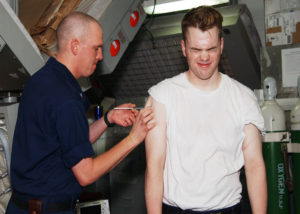 Previously overshadowed by more commonly known diseases such as syphilis, gonorrhea and chlamydia, Human Papilloma Virus (HPV) has finally hit the spotlight. HPV is actually a group of over 200 related viruses. More than 40 of these are spread through direct sexual contact and cause genital warts. Even more concerning is how they can cause certain types of cancer – like cervical, vaginal, penile and anal. And that’s just the short list.
Previously overshadowed by more commonly known diseases such as syphilis, gonorrhea and chlamydia, Human Papilloma Virus (HPV) has finally hit the spotlight. HPV is actually a group of over 200 related viruses. More than 40 of these are spread through direct sexual contact and cause genital warts. Even more concerning is how they can cause certain types of cancer – like cervical, vaginal, penile and anal. And that’s just the short list.
Vaccines have been developed to prevent infection with certain types of HPV. The FDA has approved three vaccines – Gardasil, Gardasil 9 and Cervarix. Currently only – Gardasil 9 is available for use in the US. Unfortunately, there’s no information about additional vaccines being added at this time.
The CDC recommends all children aged 11 or 12 years should get two HPV shots 6 to 12 months apart. It also recommends vaccinating young women through age 26 and young men through age 21. Although it’s not a cure-all, it does go a long way to protect young people from infection while they’re young – and preventing even more painful consequences later in their lives.
 It is important to have a good daily routine that includes 3 basic steps: cleanse, moisturize and protect. It doesn’t have to be complicated. Use a gentle cleanser and wash your face every morning and night. Follow that up with an appropriate moisturizer for your skin type. For day time, always wear sun protection. SPF 30 is best. Reapply throughout the day. This will protect your skin from sun damage and skin cancer.
It is important to have a good daily routine that includes 3 basic steps: cleanse, moisturize and protect. It doesn’t have to be complicated. Use a gentle cleanser and wash your face every morning and night. Follow that up with an appropriate moisturizer for your skin type. For day time, always wear sun protection. SPF 30 is best. Reapply throughout the day. This will protect your skin from sun damage and skin cancer. The link between oral health and systemic health has been well established through evidence-based research. Brushing and flossing don’t just make your smile look good. When you establish a daily oral health routine, you prevent pathogens that cause conditions like cardiovascular disease and diabetes from entering your system. Poor oral health is also tied in with aspiration pneumonia.
The link between oral health and systemic health has been well established through evidence-based research. Brushing and flossing don’t just make your smile look good. When you establish a daily oral health routine, you prevent pathogens that cause conditions like cardiovascular disease and diabetes from entering your system. Poor oral health is also tied in with aspiration pneumonia. Vaccinations get a lot of bad press. Yet approximately 40-50,000 adults in the United States die from vaccine-preventable infectious diseases (or their complications) each year.
Vaccinations get a lot of bad press. Yet approximately 40-50,000 adults in the United States die from vaccine-preventable infectious diseases (or their complications) each year.